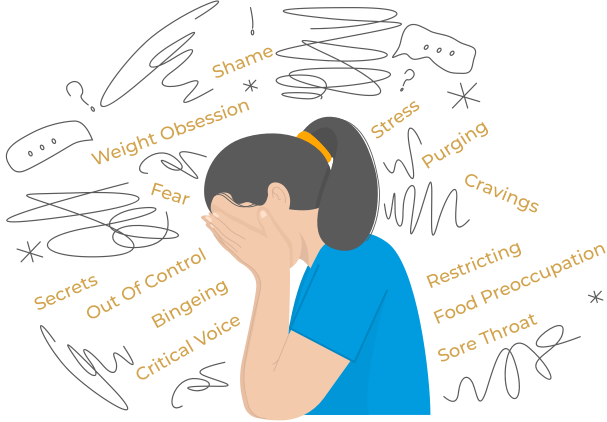Integrated Bulimia Treatment
- Tailored Healing: Customised Therapy Combining Psychological, Nutritional & Medical Expertise
- Seasoned Experts: 19 Years Delivering Professional, Evidence-Based Care
- Supportive Atmosphere: Compassionate, Respectful Support You Can Trust
BULIMIA TREATMENT
Restoring Wellness As You Balance Your Mind & Body
Are you caught in the challenging cycle of bulimia, seeking relief and a healthier relationship with food? Do you long for a sense of control and well-being that has been overshadowed by your eating disorder? We understand your struggle, and we are here to help.
Our specialised programme offers a Multidisciplinary Treatment (MDT) approach that targets both the physical and emotional components of bulimia. We listen carefully to your experience, and tailor a bespoke treatment plan, to provide you a holistic pathway to recovery.

NUTRITION
Work closely with skilled dietitians to develop balanced eating plans that promote healing and support your journey

THERAPY
Uncover the underlying causes of your eating disorder and build healthier coping mechanisms

MEDICAL
Engage with professionals who monitor your physical and mental health and address any medical concerns that arise
Take control of your health and well-being with our tailored support. Let us guide you on your journey to recovery, helping you to regain balance, confidence, and joy in your life.
TAKE CONTROL OF YOUR HEALTH TODAY – WE ARE HERE TO HELP
Struggling with weight and eating challenges? You don’t have to face it alone.
Our compassionate team is ready to listen, support, and guide you toward a healthier, happier life.
Book your free call now and take the first step.
OUR FEES
Our initial consultation is free of charge, with health coaching sessions starting from £90, therapy sessions at £120, and nutrition consultations from £200.
Health packages and multi-session bundles available – we’ll guide you to the most suitable option when we speak.
Patience – Do You Resonate With Her Story?
Patience, now in her late 30s, has grappled with bulimia since her teenage years. During her 20s and early 30s, the disorder was largely dormant, thanks to a stable life situation and supportive family environment. However, the combined pressures of raising two young children, managing her full-time job, and feeling emotionally disconnected from her husband have triggered the return of her bulimia.
Patience finds herself increasingly fixated on controlling her weight, mistakenly seeking a sense of order amidst the chaos of her everyday life. This fixation leads to the reemergence of the disordered eating habits of bingeing and purging, which become her mechanism for managing the immense stress and feelings of inadequacy she experiences as both a mother and a partner.
Aware of the detrimental impact bulimia is having on her physical health and mental well-being, Patience recognizes the urgent need for change. Despite past efforts to manage the disorder on her own, she understands that the complexities of her current life require professional intervention.
Encouraged by a supportive friend and a growing concern for her health, she decides to seek out an experienced eating disorder service that specializes in treating bulimia. Patience looks for programmes offering a holistic approach that addresses not only the eating disorder but also the emotional stress, relationship difficulties, and strategies for better stress management.
She hopes to find a treatment plan that provides a strong support network and equips her with healthier coping mechanisms, aiming to restore balance and wellness to her life.
Warning Signs Of Bulimia
Identifying bulimia early can significantly aid in effective treatment and recovery. Here, we outline key warning signs to look for, which can help you or a loved one take the first steps toward seeking professional support. Call us today, let our caring team help you take that first step to recovery.
- Evidence of binge eating include the disappearance of large amounts of food in short periods of time, and the existence of wrappers and containers indicating the consumption of large amounts of food
- Evidence of purging behaviours include frequent trips to the bathroom after meals, signs and/or smells of vomiting, presence of wrappers or packages of laxatives or diuretics
- Excessive, rigid exercise regimen – despite weather, fatigue, illness or injury – the need to ‘burn off’ calories taken in
- Unusual swelling of the cheeks or jaw area
- Calluses on the back of the hands and knuckles from self-induced vomiting
- Discolouration or staining of the teeth
- Creation of complex lifestyle schedules or rituals to make time for binge-and-purge sessions
- Withdrawal from usual friends and activities
- In general, behaviours and attitudes indicating that weight loss, dieting and control of food are becoming primary concerns
Psychological Factors In Bulimia
Bulimia is not just about food and body image; it is deeply rooted in complex psychological issues. This section explores the mental and emotional factors that often contribute to the development and maintenance of bulimia.
By understanding these psychological aspects, you’ll gain a clearer picture of how bulimia develops and the important role therapy plays in recovery. Our experienced therapists are here to help you or your loved one navigate the path to healing.
The first step is Time To Ask – book a call, or call us now on 020 7622 7727, so we can answer any questions you have about bulimia treatment and your journey to wellness.
Shame
Binge-purge cycles are repetitive patterns of behaviour that drive bulimia nervosa, and can often trigger cycles of shame and guilt.
After bingeing, you may feel overwhelmed with shame and disgust, and the momentary relief that you felt as you escaped your stress and emotions while bingeing, is gone.
Bingeing and purging can activate your critical inner voice, leading to intense feelings of shame. Sadly these feelings are often too overwhelming, and may trigger yet more bingeing and purging.
This desire to reduce emotional distress, and the false psychological and emotional relief that purging brings, reinforces bulimia.
Feeling shame, you may isolate yourself from the people around you, as you believe they will judge you negatively. This often makes bulimia something that must be hidden, a factor that can often strengthen the grip of bulimia in your life.
Stressful Emotions
Feeling overwhelmed by negative emotions, such as anxiety, stress and sadness, can lead you to turn to food for comfort.
Overeating can help you feel numb, and help you escape the emotions you fear that seem too strong or intense. You may associate binge eating and purging with feeling calm and happy, and this can make you feel addicted to the binge-purge cycle and the relief it provides.
With weight conflict, negative core beliefs and poor body image at the heart of bulimia, feelings of shame, disgust and worthlessness can activate anxiety.
You may believe that purging will make you feel better, but these unhelpful thoughts and behaviours can maintain your experience of anxiety, and keep you feeling trapped and stuck in the cycle of bulimia.

MEET JAMES, OUR FOUNDER & CEO
James shares how we work with bulimia treatment at WeightMatters.
BULIMIA TREATMENT
Our bulimia treatment addresses the complex interplay of mental, physical, and emotional factors that contribute to the disorder. You can work with one or multiple members of our team, to create a personalised path to recovery.

THERAPY
Therapy is a foundational element in the treatment of bulimia, and focusses on understanding and addressing the psychological roots of bulimia.

NUTRITION
Nutritional guidance is pivotal, where we create individualised meal plans that foster healthy eating habits and support physical recovery.

PSYCHIATRY
Psychiatric care plays a crucial role in evaluating and managing any co-occurring mental health conditions with potential medication interventions.

PRIVATE GP
Regular medical assessments conducted by our private GPs ensure that physical health is prioritised and maintained throughout the treatment.

EXERCISE PSYCHOLOGY
The integration of exercise psychology promotes balanced physical activity and mental wellness, supporting a holistic recovery strategy.
We believe being multidisciplinary in our approach allows us to work with the unique challenges you face with bulimia, so we can address them with empathy and expertise.
Let us support you on your journey toward recovery, and help you reclaim your life. Take action today.
It’s Time To Heal.
Therapy
We have an experienced therapy team at WeightMatters who specialise in bulimia treatment. Here are some interventions they may use:
1. Meal Planning & Monitoring – Therapists often work with clients to establish structured meal plans. This can include designing regular, balanced meals and snacks to help prevent the cycle of restriction, binge eating, and purging. Clients may also be encouraged to keep food diaries to increase awareness of eating patterns and triggers.
2. Thought Record Keeping – Clients are encouraged to use thought records to document and challenge negative or distorted thoughts related to eating, body image, and self-worth. By reviewing these records in therapy sessions, individuals learn to replace unhelpful thoughts with more balanced and realistic ones.
3. Exposure & Response Prevention(ERP) – This technique involves gradual exposure to feared foods and situations while preventing compensatory behaviors, such as purging. Over time, ERP helps diminish anxiety and avoidance associated with certain foods or eating scenarios.
4. Coping Skill Development – Therapists assist clients in developing healthier coping mechanisms to manage stress, anxiety, and other emotional triggers. This might include practicing relaxation techniques, problem-solving strategies, or engaging in non-food-related activities that provide comfort and distraction.
5. Mindfulness & Emotional Regulation Exercises – Mindfulness practices can help patients become more attuned to their hunger and fullness cues and reduce impulsive eating behaviors. Emotional regulation exercises, drawn from approaches like DBT, aim to help patients better manage intense emotions without resorting to disordered eating behaviors.
These practical interventions are often integrated with a deeper exploration of the themes that have initiated and maintained bulimia in someone’s life. This integrative therapeutic approach allows our therapists to tailor bulimia treatment to fit your individual recovery goals.
Nutrition
Here are some of the practical interventions our nutritionists use to support recovery and promote healthy eating in bulimia treatment:
1. Nutritional Education – Nutritionists educate clients about balanced nutrition, helping them understand the importance of macronutrients and how to incorporate them into their diets. This includes dispelling myths about certain “forbidden” foods and explaining the physiological effects of bingeing and purging on the body.
2. Structured Meal Planning – Nutritionists help create individualised meal plans that include regular, balanced meals and snacks. This structure can help stabilise blood sugar levels, reduce cravings, and prevent binge episodes. These plans often focus on normalizing eating patterns and ensuring adequate nutrient intake.
3. Guided Grocery Shopping & Meal Preparation – Some nutritionists provide practical support by accompanying individuals during grocery shopping to teach them how to choose foods that meet their nutritional needs. They may also offer guidance on meal preparation to make cooking less daunting and more enjoyable.
4. Mindful Eating Practices – Nutritionists can teach and encourage mindful eating techniques, such as eating slowly, savouring each bite, and listening to internal hunger and fullness cues. These practices help reconnect individuals with their body’s natural signals and reduce impulsive eating behaviors.
5. Addressing Triggers & Emotional Eating – Nutritionists collaborate with clients to identify specific triggers for binge eating and purging, such as stress or certain environments. They work together to develop strategies to counteract these triggers, which may include suggesting alternative coping mechanisms and non-food-related activities.
These interventions are part of our recommended multidisciplinary approach to bulimia treatment that involves collaboration with a therapist, and medical monitoring with your NHS or our private GP. This ensures a comprehensive treatment plan tailored to your individual needs and recovery journey.
Medical
When recommend some form of medical support with bulimia treatment, especially if someone has been struggling with the condition for a long period of time, and they purge several times a day. Here are some ways our medical team can support you:
1. Psychiatric Assessment – This can support a diagnosis of co-occurring mental health conditions, such as anxiety or depression, and help uncover psychological factors or traumas contributing to the bulimia presentation.
2. Medication Management – Our psychiatrist or GP can prescribe medication, such as selective serotonin reuptake inhibitors (SSRIs), to manage symptoms of depression or anxiety that often accompany bulimia. Fluoxetine, an SSRI, is particularly approved for treating bulimia nervosa and may help reduce bingeing and purging episodes.
3. Psychoeducation – Providing clients with education about bulimia and its effects can be crucial. Understanding the clinical and physiological aspects of the disorder, including how it affects mental and physical health, can empower patients to take part in their treatment and recovery willingly.
4. Monitoring & Managing Medical Complications – We can work closely with your NHS GP to ensure ongoing medical monitoring to manage complications resulting from bulimia, such as electrolyte imbalances, dehydration, and gastrointestinal issues. This may involve regular blood tests and physical examinations.
5. Motivational Interviewing – This psychological approach can be used to enhance an individual’s motivation to change their behavior. By exploring the pros and cons of changing versus maintaining the status quo, our medical team can help you articulate your own reasons for pursuing recovery and committing to treatment.
These interventions are most effective when part of a comprehensive treatment plan that involves a multidisciplinary approach, including our therapy and nutrition teams, and hybrid care with your NHS GP.
Bulimia Treatment – Getting Started
We believe it is important for clients to begin their journey by focusing on the area most impacting them. Some might initially start with therapy to address psychological and emotional factors, while others might opt to see a nutritionist first to establish a healthier eating structure.
As you progress forward through your eating disorder treatment, additional services can be seamlessly integrated into your plan. Our Healing Disordered Eating: Rebalance programme allows you to blend both our psychology and nutrition services for effective eating disorder treatment.
Let us support you with our effective Multi-Disciplinary Team (MDT) approach for bulimia treatment. Now is the time to understand your eating disorder, and develop a programme that transforms your life.
It is time to feel hopeful, heal, and start your journey to recovery.
Call us now, or book a free assessment call with our friendly client services team, who will answer any questions you have.
IT’S TIME TO START YOUR HEALING JOURNEY
You can discover our clear pricing structure.
SERVICES WE RECOMMEND FOR BULIMIA TREATMENT
Here are the WeightMatters services we recommend for bulimia treatment.
NEURODIVERSITY POSITIVE PRACTICE
We have created a healthcare space where every brain is understood, respected and supported.
IF IT FEELS MORE COMFORTABLE, EMAIL US
Do you have a question about our treatment and support?
Leave your details below, and we will come back to you with a personalised response.
